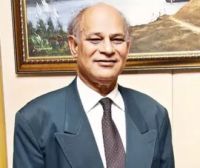Rahman, Azad

Rahman, Azad (1944-2020) a famous musician of Bangladesh. Azad Rahman was born on 1 January 1944 in a noble Muslim family in Burdwan district of West Bengal. His father’s name is Khalilur Rahman and mother’s name is Ashrafa Khatun. His father taught him music at a very young age. As a child, he studied music for a long time at the ‘Gopeshwar Sangeet Sangsad’ in Burdwan. At that time, Burdwan’s cultural and musical practices were very advanced. Azad Rahman’s student life in the 1950s and 1960s had extensive practice of classical music in Calcutta and Burdwan. Then in 1964, he obtained the first position in classical music (Kheyal) from Rabindra Bharati University, Calcutta and was awarded Gold Medal. After completing his studies, he was appointed Principal of Gopeshwar Sangeet Sangsad of Sangeet Shiklayaya Burdwan. Then he made his debut as a composer. In the mid-sixties, he worked as the first music director in India for the film ‘Miss Priyambada’. In this film, he jointly worked as the composer with Subir Sen. After that, he left West Bengal and moved to East Pakistan. In 1967, he joined radio service as music teacher, music director and music producer. At the same time, he worked at the Chayanot Music Society as a teacher of classical music. Besides working in radio, he was involved in music direction for films. In the 1980s, he concentrated on government service holding the post of Executive Director of National Performing Arts Academy, Director General of Bangladesh Shilpakala Academy, and Principal of government Sangeet Mahabiydyalaya. He retired from service in 2000.
Musician Azad Rahman played a leading role in composing Kheyal songs in Bengali language in the subcontinent. Bangla Academy published two volumes of his Bangla Kheyal in 1990. In the 1980s, a long play of his Bangla Kheyal was published. Besides two volumes on Bangla Kheyal were published from Bangla Academy. Bangladesh Shishu Academy published his work on ‘Bangla Qawali’. In 2019, with the aim of bringing together the composers of songs in Bangladesh, he formed the ‘Music Composers Association of Bangladesh’.
Azad Rahman had composed music for numerous films in Bangladesh. He consistently worked as a music director in films. A few songs of Azad Rahman’s voice are still indelible in the hearts of listeners. The timeless songs sung by him include ‘Dorakata dag dhekhe Bagh Chena Jay’ sung by him in the film named Masood Rana (1974), ‘ Valobashar Mullo Koto Ami Kichu Janina’ sung in Epar Opar (1975), ‘Karomono bhakti maer thakte hate din’ sung in Dumurer Phul (1978). In the 1975, a song sung by Abdul Jabbar ‘Ek Buk Jal Nea BandhuTumi Keno Eka Boya Berao’, on Ashok Ghosh-directed film ‘Mastan’ was composed by Azad Rahman, which still stirs the hearts of every listener.
Azad Rahman’s inimitable heart-wrenching tune that captivates us more is ‘Janma Amar Dhanya Halo Mago’ in the words of Naeem Gauhar and the voice of the legendary Feroza Begum and Sabina Yasmin. Before the Liberation War in 1971, he composed ‘Puber Oi Akashe Surya Utheche Aloke Alokmay’, ‘Jai Jai Jai Jai Bangla’ (words of Naeem Gauhar). The record released by EMI on the occasion of Ekushe February 1971 contains four songs composed by Azad Rahman. These include ‘Ekushe February’ (words of Mohammad Moniruzzaman), ‘Moder Jiban Moder’ (words of Azizur Rahman), ‘Kendona Mago’.’ (words of Abu Haider Sajedur Rahman) and ‘Eso Gari Bhagyyata’ (words Zebunnesa Jamal).
Azad Rahman was a dedicated artist of Bangladesh Betar. He composed most of the songs written by Zebunnesa Jamal for it. ‘Amra Natun Amra Kuri’ is the opening song of the first Bangladesh Television’s children’s cultural competition program ‘Natun Kuri’ had been composed by Azad Rahman. He had written numerous songs for the program ‘Eso Gaan Sikhi’.
Azad Rahman’s creative talent and breadth of work is enviable in the field of art and culture of Bangladesh, especially in various genres of music. Devoted to the spread, preservation and development of music and culture, this talented artist was equally proficient in Folk Music, Classical, Kheyal, Toppa, Thumri, Ghazal, Qawali, and modern songs. He had also shown his talent by performing ragas on western instruments.
Azad Rahman was also a filmmaker. He was the President of Bangladesh Federation of Film Societies and the Shuveccha Film Society for several years. Besides, he served as Chairman of University Music Syllabus Committee (1984-1990), Honorary Judge of National Music Competition Committee, Member of National Cultural Advisors Board (1970-1990), and of Film Censor Appeal Board.
Azad Rahman won numerous National Awards for his versatile talent. He received awards for best vocalist, best composer, best music director, which include ‘Zahir Raihan Film Award’ (1975), ‘Purbani Film Award’ (1975), ‘Chitrali Film Award’ (1975), ‘Bangladesh Film Journalist Society Award’ (1978), ‘National Film Award’ (1978), ‘National Orchestra Award’ (1980), ‘Radio Staff Artist Award’ (1982), ‘Bangladesh Film Producers’ Association Award’ (1996), ‘Nawab Salimullah Commemorative Award’ (2008), ‘Agrani Bank Award’. Musician and filmmaker Azad Rahman started the music institution ‘Sanskriti Kendra’ in 1990. This culture center has been working mainly to advance and promote Bengali music through ‘Bangla Kheyal’ training and workshops.
Musician Azad Rahman passed away on 16 May 2020. His wife’s name is Selina Azad. They have three daughters. [Jebounnessa]
